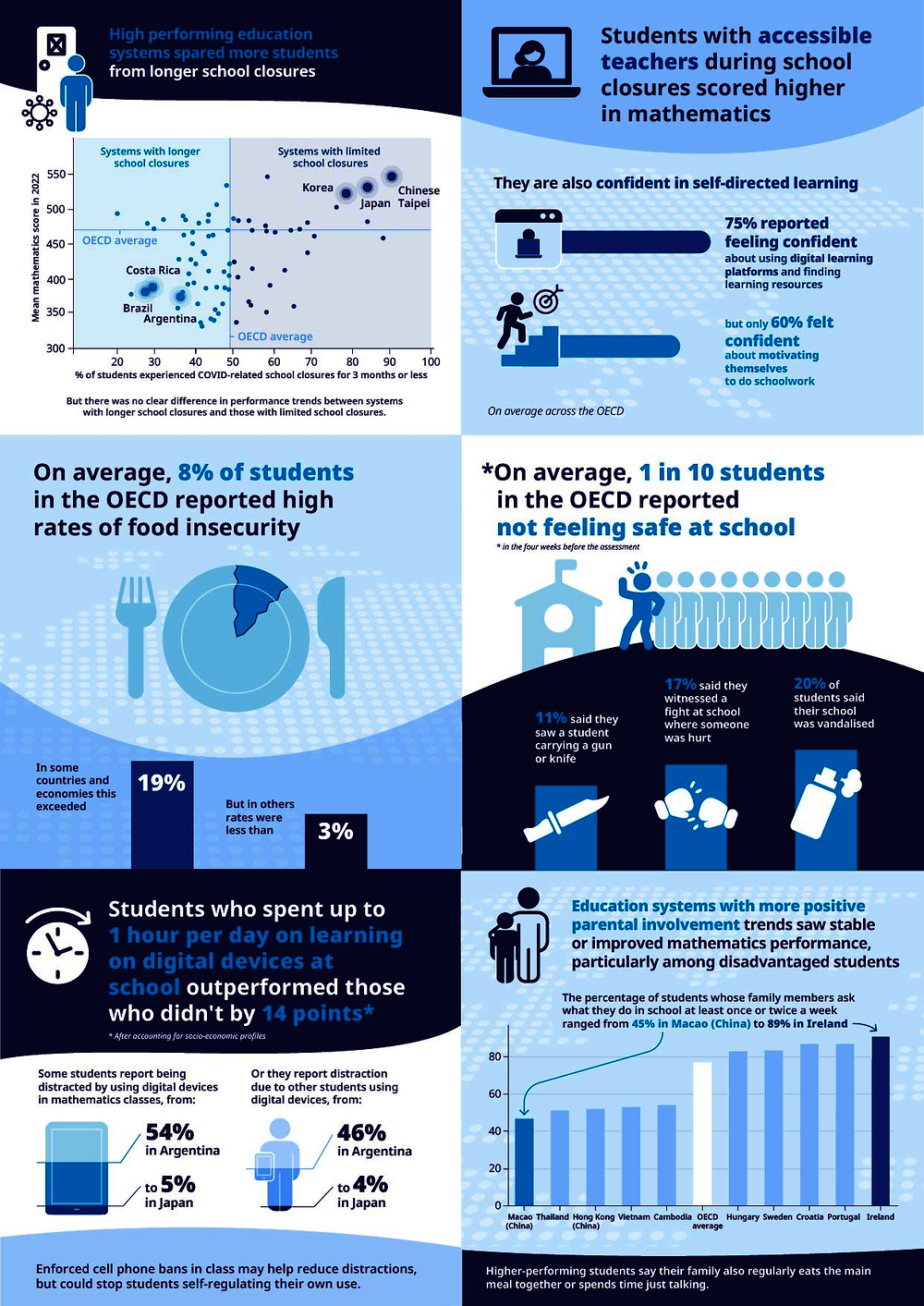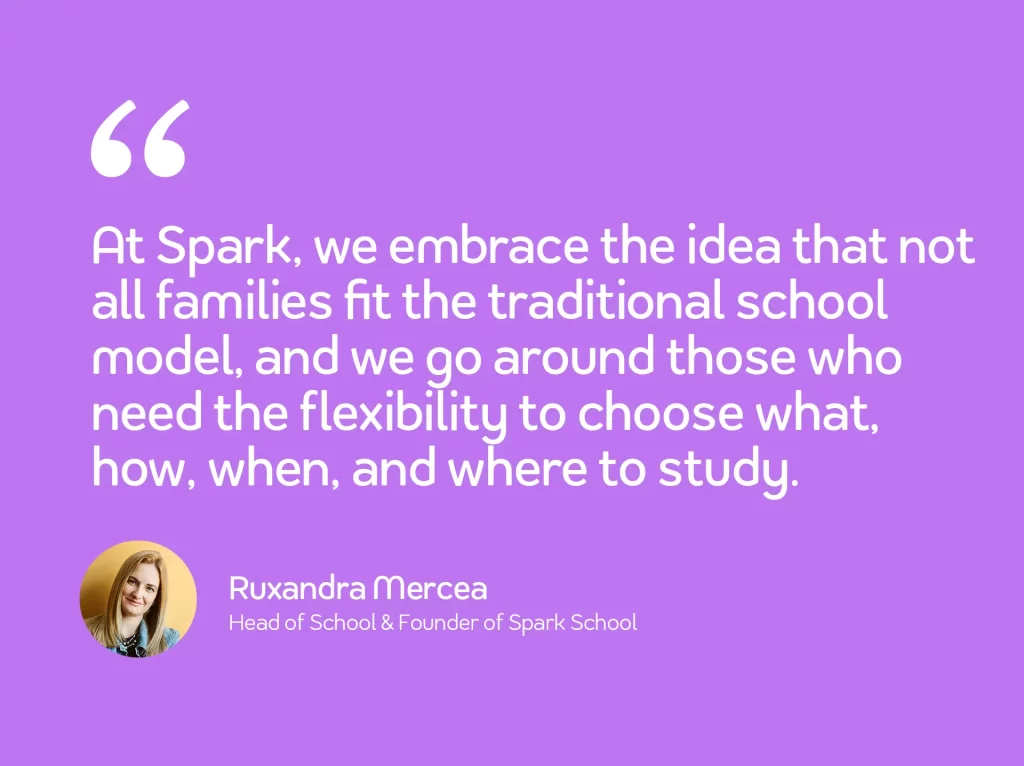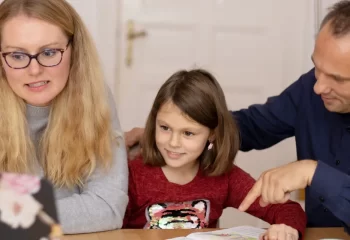Educational Trends Globally in 2023
With 2023 being the year of coming back to “normality”, we can observe some changes that the Covid-19 pandemic has brought on.
If we analyse things from an academic perspective, it’s clear that the rise of Artificial Intelligence brought on the biggest changes in education.
AI came in as a revolutionary personal classroom assistant for teachers and students, allowing for help with time management, assignment scheduling, creating personalised learning experiences for students, and the list goes on.
But did the apparition of AI and the growth of digitalisation actually help students and teachers? Or was it more like a distraction, allowing students to step away from the traditional learning environment?
Overview of the PISA 2022 results and its significance
PISA, or The Programme for International Student Assessment, is a study conducted globally by the Organisation for Economic Co-operation and Development (OECD) in member and non-member nations.
The study, initially launched in 2000, is a catalyst for testing 15-year-olds’ skills and academic levels in reading, mathematics, and science.
The last test was conducted in 2018 before COVID-19 happened. This year, over 690,000 students took part in the research.
Fast-forward 5 years since the last PISA testing, and the results have had an unprecedented drop in performance across the OECD.
Compared to the last test scores from 2018, the mean performance fell by 10 score points in reading and by almost 15 score points in maths, according to the OECD’s report.
The correlation between quality education and national development
Quality education serves as the bedrock of a nation’s development. The latest PISA 2022 results underscore the pivotal role of education in shaping a country’s economic growth, social cohesion, and global competitiveness.
Education not only equips individuals with vital skills but also fosters innovation, entrepreneurship, and civic engagement, laying the foundation for a prosperous society.
Well-being, for example, is one of the topics researched in the PISA test, and it turns out that it is pretty necessary for schools to focus on well-being in order to educate healthy and happy students who can thrive no matter in the world.
Furthermore, disparities in educational quality highlighted by PISA 2022 emphasise the urgency for universal access to education, updated curricula, and robust policy frameworks to bridge gaps in education.
There are obviously many more interesting findings in the report, and we urge you to read the full version of it here if you’re curious to learn more.
Understanding the PISA 2022 Results
The 2022 PISA results show that Education is done differently from country to country.
If, for some countries, the period of COVID-19 didn’t signify a roadblock in education, others seem to have been affected by the transition to digital learning.
Key findings – according to the PISA Report Summary
- Eighteen countries and economies performed above the OECD average in mathematics, reading and science in 2022
- Between 2018 and 2022, mean performance in mathematics across OECD countries fell by a record 15 points
- Reading fell 10 points, twice the previous record, whereas science performance did not change significantly
- On average, reading and science trajectories had been falling for a decade, though math had remained stable between 2003-2018
- Colombia, Macao (China), Peru and Qatar improved in all three subjects on average since they began to take part in PISA.
- Many countries, including Cambodia, Colombia, Costa Rica, Indonesia, Morocco, Paraguay and Romania, have rapidly expanded access to education over the past decade – making significant progress towards universal secondary education
Struggles in specific areas
The studies show that children who have not been going to school for longer periods of time have been scoring lower on PISA tests than those who returned to school quicker in the COVID-19 period.
This should not mean that digitalisation is not the way, but the fact that we might not prepared to tackle it responsibly or accordingly.
The report of the results also notes the fact that there were significant differences in test results between students who reported receiving extra support from teachers during the COVID-19 period and those who had to learn autonomously most of the time.

(Source: OECD Website)
Challenges in Traditional Education Systems
The PISA report highlighted some challenges that the current education system faces worldwide:
- Inadequate Resources
- Teacher Shortages and Quality
- Outdated Curricula and Teaching methods
are only a few of the things that are holding back educational systems that could be greatly improved.
When it comes to the topic of wellbeing in schools, some countries are doing a great job in turning schools into safe spaces and focusing on their students’ wellbeing. However, this is not the case everywhere, and there’s still a lot to improve.
This is exactly why online high schools like Spark are fighting the great fight of making education universally accessible for students no matter where they are in the world.
Because everyone should have a chance to get a quality education.

Advantages of Online Education in Overcoming Educational Disparities
Online education offers crucial advantages in addressing educational disparities:
-
Accessibility: Reaching remote and underserved areas
Online platforms like the one we use at Spark – MySpark- bridge gaps by providing access to education for remote and underserved areas, as highlighted by the results revealed by the PISA 2022 testing.
-
Customised Learning: Tailoring education to individual needs
Tailored learning experiences cater to individual needs and learning paces, ensuring inclusive education regardless of diverse learning abilities.
At Spark, Students can study what they want, when they want to, from anywhere in the world. Because we understand the need for different types of learning and lifestyles.
-
Quality Resources: Access to updated, high-quality educational materials
Access to regularly updated, high-quality educational materials enriches learning experiences, surpassing limitations faced by traditional education systems in resource availability.
-
Global Collaboration: Breaking down geographical barriers to learning and collaboration
Geographical barriers are dismantled as online education enables global interactions (at Spark, we have students from 21 countries, for example) and cultural exchange. It also fosters global competencies emphasised in the PISA 2022 results.
Why Our Approach Matters
At Spark, we are a global melting pot for students and families who want or need something different.
Families are looking to secure quality education for their teenagers – one that aligns with their needs and lifestyles.
Some of our students are:
- Professional Athletes
- Future Scientists
- Ambitious students taking Academic courses only
- Always on the move
- Living on a different continent
Did you notice anything about this list? It’s as diverse as it gets, and so is our approach to education.
Our strength is flexibility. We allow flexibility for our students to join Spark from anywhere in the world and create learning journeys that revolve around their goals and needs.
“Our core objective at Spark is to invest in young people’s potential through tailored methods that can support their academic growth.
We aim to prevent the loss of the high school years in an educational system that may not align with their desires and abilities.
At Spark, we embrace the idea that not all families fit the traditional school model. And we go around those who need the flexibility to choose what, how, when, and where to study.”
Ruxandra Mercea, Head of School and Founder of Spark School
Key things to take away
Education is and will always be in constant change. In a world where academic stability is not always granted automatically, Spark wants to be the beacon of hope for ambitious students needing quality education.
With technology still on the rise, we should be mindful of the changes happening in our society. And we should learn to trust and consider technology an ally in our lives.
Nowadays, various online schools like Spark or online course platforms promote learning globally.
Some courses are freely available on the internet, and for other things like digital literacy, we should learn to be our own teachers. After all, autonomous learning was one of the weak points that the PISA 2022 reported in students.
Remember…
Learning can happen anytime, anywhere.
No matter if we are enrolled in a traditional schooling system or not, there are always additional resources available to us – thanks to digitalisation.
The Spark Cambridge Academic courses are a great resource for students enrolled in traditional education systems to enhance their learning experiences and be better prepared for University Admission.
For students dreaming of flexibility and a curriculum tailored to their needs, our High School might be the best possible answer.
We not only focus on academics but also care deeply about the wellbeing of our students and community, and we aim to teach relevant and future-ready skills that prepare students for the world.
Get in touch with us today, and let’s see how Spark could improve your educational journey!
FAQ Online Learning Bridging the Gap in Global Education Challenges
What challenges does the Traditional Education system face, as highlighted by the PISA 2022 report?
The PISA report highlighted some challenges that the current education system faces worldwide:
- Inadequate Resources
- Teacher Shortages and Quality
- Outdated Curricula and Teaching methods
- Lack of Wellbeing Resources in Schools
What role does online education play in addressing disparities highlighted by the PISA 2022 results?
Online education addresses the challenges outlined in PISA 2022 by providing accessibility to remote areas. It also offers tailored learning experiences and high-quality resources to students. And it fosters global collaboration and creates a more inclusive educational landscape.
How does Spark School’s educational model align with the changing educational needs mentioned in the PISA 2022 report?
Spark School’s educational approach offers flexibility, tailored learning experiences, and future-ready skills. It aligns with the report’s call for personalised education and technological integration. The digital learning platform allows students to join Spark from anywhere in the world and get access to a quality education. Students at Spark are also great autonomous learners. They are able to manage their own learning and schedules.




